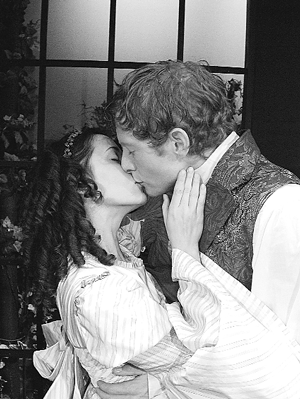Tom Stoppard’s “Arcadia” triumphs in an intimate Village venue
Brilliant British wit, introspective drama and sultry romance fuse into the present day discovery of an intriguing two-century forgotten murder mystery that deliciously ponders the interaction between science and poetry in Tom Stoppard’s “Arcadia,” now playing at Manhattan Theatre Source. The Invisible City Theater Company’s production fits perfectly with the play’s humorous yet cerebral sensibilities.
The story alternates between the Coverly family’s English countryside estate in 1809, where the schoolgirl musings of young Thomasina and the insight of her charmingly decadent tutor, Septimus Hodge, unwittingly uncover the beginnings of thermodynamics in her math homework, and the same estate in the present, where a group of academics engage in a battle of wills and intellects while investigating an apparent murder mystery from two centuries before.
The suspected culprit is none other than the intriguing, young, womanizing poet Lord Byron, a Trinity College mate of Hodge’s. In the estate’s past, passions enflamed as scandalous affairs and jealousy crept up among the characters, while in current day tempers flare when Bernard Nightingale myopically endeavors to convict Bryon of murder while Valentine Coverly and Hannah Jarvis begin unraveling the mysteries of Thomasina’s discovery compounded by the strange presence of an unidentified hermit who seems to have lingered at the estate after a tragic death in 1812. In the midst of the chaos, a timeless truth emerges. While science may prove the universe impossible to understand and poetry may fail to illustrate the dissonance in human experience, life is a fragile gift to savor.
The content may sound heavy, but Stoppard’s radiant writing keeps the audience chuckling throughout. The first act opens with Septimus carefully explaining the meaning of “carnal embrace” as the act of “hugging a side of beef” to the innocent Thomasina, who seems to have heard rumors of one Mrs. Chater involved in the act in the gazebo. Although Stoppard wrote the play in 1993, some of the humor becomes even more pointed today, especially a short rant on the terrors of “godless republicanism,” a clever inversion of the meaning of those terms today.
Perhaps the most enjoyable aspect of the Invisible City production of “Arcadia” is the venue. Manhattan Theatre Source offers an exceptionally intimate performance space. Those sitting in the first of the mere three rows must be mindful of their legs in order to keep from tripping the actors as they strut, stomp, shout, dance and ardently kiss within feet of the audience. At intermission, feel free to wander about the cozy collection of used books or snuggle into one of the plush couches, or get some coffee downstairs.
Although within eye contact of every audience member, the cast performs with staggering vividness, capturing the subtle nuances of the humor and conveying the dark romance of sex, death and blind obsession.
Adam Devine plays Septimus Hodge perfectly from his opening slippery banter about “sexual congress” to his closing gaze that follows Thomasina offstage with a visible pity for her innocence and some eerie foreshadowing of an uncomfortable and evasive sadness lingering in his eyes. Devine masterfully exposes the character shift in Hodge and plays the part of an English gentleman with such charm that the audience cannot help but admire him. Christine Albright, a recent arrival in New York from San Diego, develops Thomasina from an innocent, hardly noticeable schoolgirl to a suddenly beautiful and sexually moving force when she beckons Septimus to teach her to dance in the final scene.
David Ian Lee and Avery Clark carry the cast in the scenes set in the present. Lee delivers fiery bouts of shouting and vicious attacks as a professionally threatened and desperate Bernard Nightingale. “Why does scientific progress matter more than personalities?” he shouts, reducing Clark’s Valentine Coverly to tears. Clark’s performance started slow and his accent faltered at times, but he conveyed a cool demeanor that made Coverly a balancing force between warring Nightingale and Hannah Jarvis, played adequately by Rebecca Miller.
The actors are divided between present and past, and only share the stage briefly in the final act, when the events are juxtaposed between 1812 and the present. Their invisible interactions bring chills to an already breezy room (dress warm) and do justice to Stoppard’s effort to lend meaning to the events of 1812 with the realizations achieved today.
The cast brought a new, intimate production of one of Stoppard’s most intriguing story lines. Devine proves himself a perfect Septimus Hodge and Manhattan Theatre Sources demonstrates its success as one the most enjoyable small venues for theater in the Village.


































